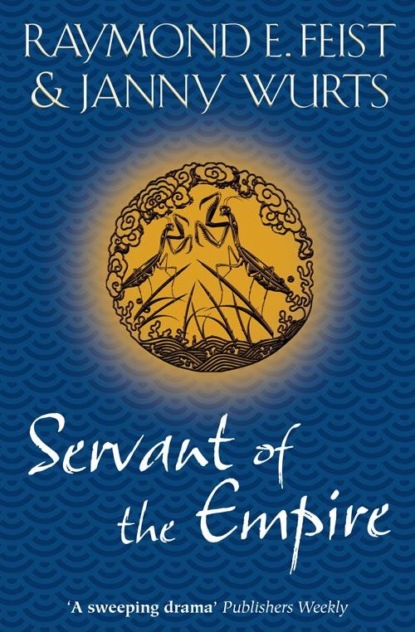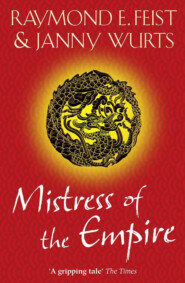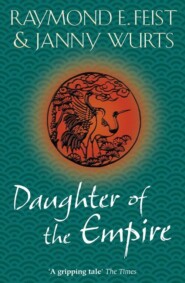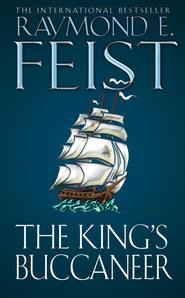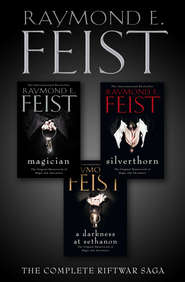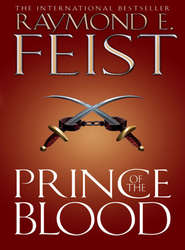По всем вопросам обращайтесь на: info@litportal.ru
(©) 2003-2025.
✖
Servant of the Empire
Автор
Год написания книги
2018
Настройки чтения
Размер шрифта
Высота строк
Поля
A movement reawakened Incomo to the present. He nodded in greeting to another ruler come to pay homage to Desio. Then the Minwanabi First Adviser took a deep breath and collected himself. He had managed the household through Desio’s days of dissipation with what seemed unassailable calm. But behind his emotionless, correct bearing, Incomo battled with terror. For the first time in a long life of playing the Game of the Council, he knew paralysing fear of another ruler.
His only defence against this dread was an anger fuelled by the image of Mara and her retinue crossing the lake. Dozens of other lords had departed with her, their coloured craft flocked together like waterfowl in mating plumage. Among that flotilla had been the massive white-and-gold barge of the Warlord. Almecho had moved his celebration from Jingu’s estate to the lands of the Acoma, as telling a sign of the Minwanabi fall from grace as any single thing could be.
That moment a shadow crossed Incomo’s face, ending his interval of reflection. A lean, graceful warrior mounted the dais to kneel at the feet of the new Lord. Tasaio, son of Jingu’s late brother, bowed low and presented himself to his rightful master. Tasaio’s auburn hair was tucked back into an elegant jade pin. His profile was slightly aquiline, and his bearing was impeccably correct; hands, scarred lightly from past battles, possessed the beauty of strength honed to an edge of perfection. He was the image of a humble warrior, sworn to serve his master, but nothing could hide the burning intensity in his eyes. He smiled up at his cousin and gave his pledge. ‘My Lord, this I swear, upon the spirits of our common ancestors, even to the beginning of time, and upon the natami wherein resides the Minwanabi spirit: to you I pledge honour in all things. My life and death are yours.’
Desio brightened as the most able rival to his place as ruler bowed to tradition. Incomo put away his futile wish that the Cousins’ roles had been reversed; had it been Desio bending knee before Tasaio, then would the Acoma have trembled. Instead, irrevocably, the cleverer, stronger man bound his fate to the weaker. Incomo found his hands clenched to fists, his nails gouging into his palms.
Something still nagged at him from the night when Minwanabi fortunes had soured. As Tasaio arose and marched from the dais, the First Adviser considered a new thought. Mara had managed to discover the plot to end her life – but no, Incomo corrected himself, of course she expected the attack – yet somehow she had sensed the moment and the manner of the strike. Luck could not explain such fortune. Coincidence on that scale was unlikely to the point of impossibility. The Mad God of Chance would have had to have been whispering in the Lady’s ear for her to have simply guessed what Jingu and his courtesan agent had planned.
The last Minwanabi allies were filing by, completing their assurances of friendship to Desio. The First Adviser regarded each expressionless face and concluded that their protestations were about as useful as weapons made from spun sugar. At the first sign the Minwanabi were vulnerable, each Lord here would be seeking new alliances. Even Bruli of the Kehotara had refused to renew the vow of complete vassalage his father had embraced with Jingu, leaving doubts as to his reliability. Desio had barely hidden his distaste as Bruli mouthed a promise of friendship, then departed.
Incomo smiled mechanically at each passing noble as he reviewed his own concerns. He replayed the events of the past again and again, until logic at the last yielded the answer. His conclusion was shocking, unthinkable: the Acoma must have a spy within the Minwanabi household! Jingu’s plot had been carefully laid, inescapable without privy information. Incomo found his pulse racing as he considered the ramifications.
The Game of the Council knew no respite. Always there were attempts to infiltrate the rival houses. Incomo himself had several well-placed agents and had personally thwarted attempts to penetrate the Minwanabi household. But somewhere, all too obviously, he had missed one. The Acoma spy might be a servant, a family factor, a warrior wearing an officer’s plume, even a slave. Now enmeshed in thought to trace the culprit, Incomo viewed the ceremony with impatience. Protocol demanded he remain at his post until the formalities closed.
The last Lord made his appearance. Desio dragged through an interminable speech of thanks. Incomo almost fidgeted with restlessness. Then the priests of Turakamu resumed their cursed whistle blowing and another ritual dance. At last the recessional began, Desio’s honour guard marching in measured steps out the portals from the great hall. Posted at Desio’s shoulder, but a half pace behind, Incomo reviewed each senior member of the household.
His quick mind narrowed down the possibilities, eliminating blood relations and those in service since early childhood. But even after these were put aside, the possibilities for enemy agents were still vast. So many servants had been acquired over the last three years that Incomo faced a daunting search. To dismiss these new staff members in large numbers would be a clear admission of weakness. To use torture to discover which one might be the turncoat would only alert the spy. He, or she, might then slip between their fingers. No, far better to move with caution.
The procession continued through the tunnelled hallway. Outside, the late afternoon sun dipped behind the trees. Long shadows fell over the column as honour guard and guests marched in measured step to the place appointed for the next part of the ceremony. Benches had been laid in a circle in a natural amphitheatre formed by a fold in the hills. The guests found seats in silence, and looked down upon the expanse of cleared ground in the centre. Four large holes had been dug there, a pair flanking the main road. A company of soldiers and workers awaited in neat array beside a huge, newly erected wooden frame bedecked with pulleys and ropes.
Incomo took his place on one of the central benches and strove to focus on the proceedings. Unlike Desio’s assumption of office, this was no mere formality. To build a prayer gate was to invoke the presence of a god and beg favour; to erect a monument to Turakamu, the Red God, was to risk destruction should the act be looked upon with disfavour.
The priest of Turakamu and his acolytes began dancing around the four painted beams that awaited placement in the waiting holes. They spun with mad energy, accompanied by eerie yells and blasts on the sacred bone whistle. The head priest’s naked flanks heaved with exertion, and sweat traced clean patches in his red and black ceremonial paint. The bouncing of his flaccid genitals amused Incomo. The First Adviser scolded himself for his impiety. Rather than laugh and earn the Red God’s displeasure, he averted his eyes slightly, out of respect for the holy performance.
Two groups of workers waited nearby in silence. Among them, out of place and oddly ill at ease, stood servants and their families. A girl of about seven cried and clung to her mother’s hand. Incomo wondered if the spectacle of the priest frightened her. The next moment, the head priest ended one of his spins in a motionless crouch before the little girl’s father. The acolytes screeched in unison. They sprang forward, caught the man by the shoulders in a ritual grip, and led him to the nearest of the holes. The bone whistle shrilled in the afternoon heat. The chosen man closed his eyes and silently jumped down into the hole, which was deep, and wide.
Then the act was repeated with another man, whose wife hid her face in a most unseemly way. When the second hole was occupied, the priest gave a tortured shriek. Then he intoned, ‘Oh Turakamu, who judge all men at the last, welcome to your service these two worthy spirits. They shall stand eternally vigilant over this, your monument. Look upon their families with charity, and when their children pass at length through your hall, judge them kindly and return them to life with your blessing.’
Incomo heard the opening ritual with a rising unease. Human sacrifice was rare in the Empire, and while no longer common, it was still a practice in the Red God’s temple. Obviously, these two workers had volunteered to become sacrifices for the gate, in exchange for the hope their children might return to their next life born to higher station: warriors, or perhaps even lords. Incomo considered that a thin bargain at best. If a man was pious enough, should the gods not grant him favour, as temple aphorism stated?
Yet only a fool would speak against an offering to the Red God. Incomo watched in stony stillness as the volunteers were tucked into their holes, knees under chin and hands crossed in semblance of eternal prayer. The priests screeched a paean to their divine master, then signalled work crews to hoist the massive timbers that would support the arch of the gate. Ropes creaked under the strain as the workers hoisted the first upright high; they chanted and swung the beam, and a scythe of shadow crossed the pit as the end was jockeyed into position. Now the crowd of Minwanabi supporters was frozen, awaiting the moment of sacrifice. A foreman with a squint judged the position correct; he signalled to the head priest, who touched his bone whistle to his lips and blasted the quavering note that would summon the god.
As the call faded, and a hush claimed the gathering, two lesser priests raised a sacred axe of shining obsidian and slashed the ropes. The carved pole was released, thudded downward into the waiting hole, and crushed the first servant like a bug. A spatter of blood sprayed up from the earth, and the sobbing child tore from her mother’s hold and threw herself against the post that had slain her father. ‘Bring him back! Bring him back!’ she cried repeatedly as Minwanabi soldiers dragged her away.
Incomo knew the Red Priest counted this an inauspicious start. In an attempt to appease his god, the priest revised the ritual from first-level sacrifice to second. He clicked his bone rattle with his fingernails, and his acolytes donned ceremonial masks. The second victim was dragged from his hole, confusion plain in his eyes. He had expected his end to be the same as his predecessor’s, but apparently this was not to be.
The first masked acolyte stepped forward with a bowl and an obsidian knife. He said no word, but at a gesture from the head priest, the men gripped the farmer spread-eagled over the bowl. The acolyte raised his knife, chanting, and called for the god’s favour. He laid the blade first on one side of the pinioned man’s temple, and then the other, consecrating the sacrifice. The unfortunate farmer trembled under the touch of the stone knife; he flinched as its keen edge cut a symbol into his forehead, and strove to endure without outcry as a slash from the priest opened his right wrist.
Blood pattered into the dust like obscene rain. Acolytes became spattered as they rushed to catch the drops in the bowl; and like a litany of the damned, the whistle of the priest shrilled again. The second upright was hoisted. The obsidian knife darted again and drank from another vein. Now the farmer whimpered. He felt his life draining away, but the end could not come quickly enough to deaden his fear. He stumbled against the priests as they lifted him and lowered him head downward into the pit. The beam swung overhead. The whistle wailed, entreating the god to grant his favour. The head priest signalled, hastening the ceremony, since, for the gift to be acceptable, the waiting sacrifice must not lose consciousness and die before time. Yet haste cancelled precision. As the ropes were slashed, one acolyte hesitated, and the massive timber turned slightly as it fell. Its bole crashed against one lip of the hole; dirt and rock cascaded downward, bringing an involuntary yelp of terror from the victim. Then the full weight of the trunk sheered down the sidewall. The timber crushed the legs and hips of the farmer but did not kill him outright. He screamed uncontrollably in pain, and the ceremony became shambles.
In vain Desio shouted for workers to right the tilted trunk. Pale in his rings and finery, he threw himself face down on the bloodied earth and begged the Red God’s forbearance. The head priest advanced, his whistle silenced. Before all the waiting company, he rattled his beads and bones and solemnly announced his divine master’s displeasure. Over the wail of the maimed sacrifice he demanded to hear what the Lord of the Minwanabi would pledge to regain the Red God’s favour.
Behind the tableau of Lord and priest, slaves strained at ropes, and the gate timber was slowly dragged upright. The farmer’s screams changed pitch but did not stop. Workers rushed forward with baskets of earth and upended them into the pit, and gradually the cries became muffled; no one dared end the farmer’s agony. His life had been consecrated to the god, and to interfere would bring curse.
Sweating, his face smeared with dust and gore, Desio sat up. ‘All-powerful Turakamu,’ he intoned, ‘I pledge you the lives of my enemies, from the highest of noble blood to the life of the lowliest relations. This I promise if you will stay your wrath and allow Minwanabi victory!’ To the priest he said, ‘If the all-powerful sees fit to grant my humble appeal, I promise a second grand prayer gate. Its posts shall be consecrated with the lives of the Acoma Lady and her firstborn son and heir. The path beneath shall be paved with the crushed stone of the Acoma natami, and polished by the feet of your devoted worshippers. This I will give to the glory of the Red God if mercy is shown for the transgressions that have happened this day.’
Desio fell silent. The priest stood over him for a moment, unmoving. Then he assented with a sharp jerk of his head. ‘Swear your promise,’ he boomed out, and extended his bone whistle for Desio to seal his pledge to the god.
Desio reached out, convinced that once his hand clasped the bone, he was committed irrevocably. He hesitated, and a hiss from the priest warned he was close to bringing the Red God’s wrath. Feverishly he grasped the relic. ‘I, Desio, Lord of the Minwanabi, swear.’
‘Upon the blood of your house!’ commanded the priest.
Onlookers could not help but gasp, for the priest made clear the Red God’s price for failure. Desio embraced the same destruction for his entire house, from himself down to his most distant relative – the same ruin he promised the Acoma – should he fail. Even should both sides come to desire truce in the future, no quarter was now possible. Within the near future one of two ancient and honourable houses would cease to exist.
‘Turakamu hears your offering,’ the priest cried. As Desio released the relic, the priest spun and gestured to the incomplete gate, which arose like blackened pillars against the sky of sunset. ‘Let this gate stand incomplete, from this day forth. Its posts shall be carved into columns with the promise of the Minwanabi inscribed on each side. Neither shall this monument be changed or taken down until the Acoma are ashes pledged to the glory of Turakamu!’ Then he looked at Desio. ‘Or the Minwanabi are dust!’
Desio dragged himself to his feet. He seemed shaken, overwhelmed by a poor beginning to the grandiose oath he had sworn. Incomo’s lips thinned with anger. If there was an Acoma spy in the Minwanabi household, he had more to worry about than rumours as aftermath from this day’s affairs. The First Adviser studied the expressions of the family members as they departed; most showed strain, a few looked frightened, and here and there a noble swaggered with his chin jutted aggressively. Many would seek to advance themselves in the family hierarchy if Desio proved a weak ruler, but no one seemed particularly satisfied by the terrible turn of the day’s events. Abandoning the attempt to divine the spy by naked will, Incomo sought his master.
Tasaio stood at the side of his Lord, supporting Desio’s elbow. Although the Lord was the one wearing armour, there was no mistaking which was the warrior. Tasaio’s carriage held the unthinking and deadly grace of the sarcat. Incomo hurried closer. Words reached his ears, blown on the rising winds of an incoming storm.
‘My Lord, you must not look back upon the mishaps of today as ill-omened. You have sworn our family to a powerful oath. Now let us see what we can do about fulfilling it.’
‘Yes,’ Desio agreed woodenly. ‘But where to begin? Mara has cho-ja warriors guarding her estate house; outright assault is folly without the Warlord’s favour. Besides, even should we be victorious, we would be weakened, and a dozen other houses would rush to seek advantage over us.’
‘Ah, but, cousin, I have ideas.’ Tasaio sensed an approaching step, looked around, and identified Incomo. His quick, flashing smile seemed calculated to the First Adviser, despite its spontaneity. ‘Honoured First Adviser, I urge that we convene a meeting. If our Lord can fulfil his oath to the Red God, much glory may be gained for our house.’
Incomo searched the words for irony – to fail a promise to the Death God would bring the Minwanabi to final ruin – and saw that Tasaio was sincere. Then he examined the usually stern face for any hint of deceit, but found none. ‘You have a plan?’
Tasaio’s smile widened. ‘Many plans. But first I understand we have to flush out an Acoma spy.’
While Desio’s soiled face showed muddled astonishment, Incomo struggled to conceal suspicion. ‘How could you know about that, honoured cousin?’
‘But we have no Acoma spies in our midst!’ Desio broke in, suddenly and righteously outraged.
Tasaio laid a calming hand on the young Lord’s arm, his words directed mostly toward Incomo. ‘But we must. How else could that stripling bitch know our last Lord intended to kill her?’
Incomo inclined his head as if acknowledging a victory. That Tasaio had also surmised the cause of Mara’s survival at the Warlord’s celebration showed the depth of his thinking. ‘Honoured cousin, for the good of us all, I think we should listen to your plans.’ With a withered scowl, he reached out and helped the tall warrior shepherd his Lord back to the shelter of the estate house.
Ancient parquet floors creaked as servants hustled about, adjusting screens and drapes against rising breezes from the south. An approaching storm scudded clouds over the lake’s silvered face, offering early but unmistakable presage of the wet season. The smell of rain mingled with the indoor scents of furniture oils and dust that ingrained the small study, a private chamber used by Jingu and his predecessors to formulate their deepest plots. The painted window screens were small, to discourage observers from the outside, yet the air was never stifling.
Damp made Incomo’s bones ache. Concealing an urge to frown, he folded himself neatly onto the cushions opposite the Lord’s seat, an elaborate nest of pillows atop a two-inch-high dais. Some long-past Minwanabi ancestor had decided that a Lord should at all times be raised above his retainers, and most rooms in the older portions of the estate house bore the token of his belief.
Incomo had been reared to the inconvenience of multilevel floors and of flagstones on certain walkways that were a half-step higher than those adjacent; but a new servant was always conspicuous by the number of times that he tripped. Sourly, his thoughts preoccupied by spies, Incomo considered which factors and servants had been clumsiest while serving his late-departed Lord; none came immediately to mind, which added to the First Adviser’s discomforts. In frustration, he awaited his master.
The servants had departed by the time Desio could be unlaced and divested of his ceremonial armour and be wrapped in an orange silk robe sewn with black symbols connoting prosperity. He did not dally longer with bathing, as his father had been wont to do; smelling faintly of nervous sweat, he entered with his cousin in attendance and levered his bulk onto the precious gilt-edged cushions that his predecessor had worn thin before him. Desio was agitated. Incomo decided he looked as if he was coming down with a cold, pale as reed paper about the face, except for his nose, which was pink. Beside him, his cousin looked tanned and lean and dangerous.
While Desio squirmed his way into a comfortable position, Tasaio settled and rested his elbows on his knees. Beside Desio’s fidgeting, Tasaio owned the taut stillness of a predator while it tests the air.
Tasaio had lost nothing by serving in the barbarian wars for the past four years, Incomo concluded. Although the war had not advanced as well as the Warlord had promised, the time away from the Game of the Council had only sharpened the young man’s wits. He had risen to the position of First Subcommander to the Warlord, Almecho, and had gained great advantages for the Minwanabi – until Jingu’s death had humbled them.
‘My esteemed cousin and my First Adviser,’ Desio opened, struggling to mask his inexperience and at least act the part of Ruling Lord, ‘we are gathered here to discuss the possibility of an Acoma spy in our midst.’
‘No possibility, but a certainty,’ Incomo snapped. What the household needed was action, swiftly and decisively carried out. ‘And we must not assume there is only one.’
Desio opened his mouth in outrage, both against his First Adviser’s impertinence and also to rebut the idea that the Acoma could have infiltrated Minwanabi ranks more than once.
Tasaio’s lips tightened in barely withheld contempt; but no disparagement showed through his tone as he smoothly and gently interjected. ‘Your father was a great player of the game, Desio. If not through underhanded treachery, how else could a girl child have come to best him?’





